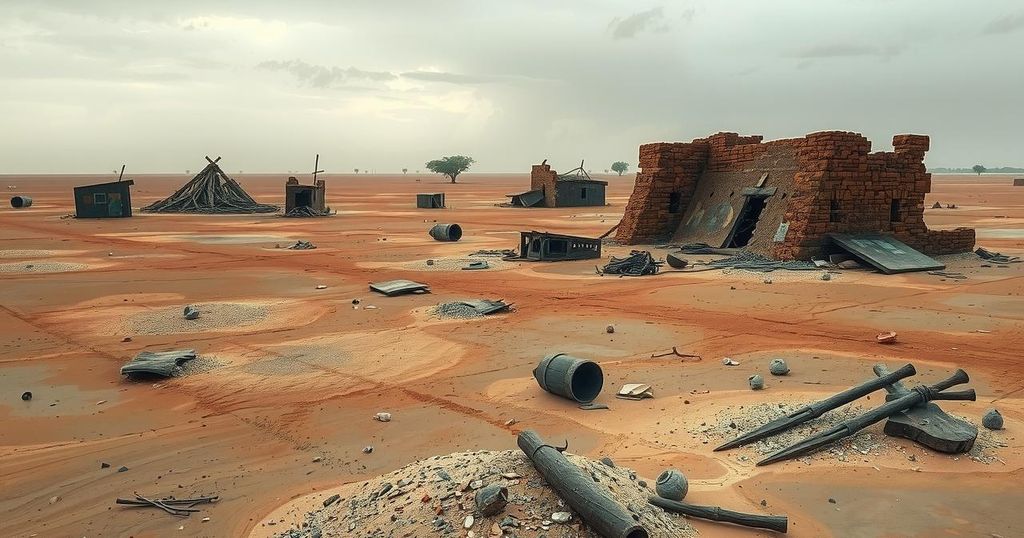South Sudan: A Fragile Peace on the Brink of Collapse

South Sudan, the world’s youngest nation, faces a potential return to civil war as a fragile peace deal collapses. President Salva Kiir’s government and rival Riek Machar’s arrest highlight escalating tensions fueled by ethnic division and violence. International bodies warn of worsening conditions, urging diplomatic intervention to prevent another catastrophic conflict in a deeply impoverished country.
The potential collapse of a peace deal in South Sudan, which has already experienced significant atrocities, raises serious fears about the outbreak of another civil war in this perilous nation. Having declared independence from Sudan in 2011 after a lengthy struggle, South Sudan has faced persistent instability, marked by a civil war erupting in 2013 and again in 2016. A tenuous truce was established in 2018, but recent developments threaten to unravel these fragile gains.
Under a coalition government headed by President Salva Kiir, who is supported by five vice presidents including Riek Machar of the SPLM/A-IO party, tensions have resurfaced. This week, Machar’s arrest ignited concerns, with the SPLM/A-IO stating that his detention jeopardizes the existing peace agreement. The organization indicated that the potential for peace in South Sudan is now at serious risk.
The recent turmoil is compounded by the sacking and arrest of several SPLM/A-IO officials, alongside an invitation issued by Kiir for Ugandan troops to assist against local militias. The SPLM/A-IO condemned what it termed military aggression from Ugandan forces. On March 23, Machar escalated tensions by denouncing this intervention to the UN Secretary-General as a violation of the peace terms.
Since South Sudan has never conducted a national election, the government currently exists due to a power-sharing accord forged in 2018, which was aimed at resolving a five-year civil war that claimed approximately 400,000 lives. The political landscape remains divided primarily along tribal lines between the Dinka and Nuer ethnic groups, associated with Kiir and Machar respectively.
Recent clashes in Nasir between government forces and a militia known as the White Army have deepened instability, with reports of fatalities following these skirmishes. Authorities have since accused Machar of instigating rebellion while asserting that the militia has disavowed any connection to him or his party.
Michael Makuei, South Sudan’s information minister, accused Machar of inciting unrest with intentions to prevent elections and plunge the country back into war. He asserted that investigations would be conducted into Machar and his allegiants for promoting division and anti-peace strategies, although the SPLM/A-IO has not responded to these allegations.
Internationally, the unrest has not gone unnoticed. UN representatives have urged caution, indicating that Machar’s arrest brings South Sudan “closer to the edge of a collapse into civil war.” The UN Secretary-General emphasized the dire state of the peace agreement, prompting calls for de-escalation from various Western nations. Consequently, the US embassy has advised American citizens to evacuate South Sudan due to the hazardous atmosphere.
The African Union has pledged to send a delegation to Juba to assist in calming tensions, while ongoing dialogue seeks a potential path to resolution and stability, buoyed by optimistic sentiments from Kenyan leaders post-discussion with Kiir.
A recent World Bank report painted a grim picture, noting that existing violence, mismanagement, and political strife continue to exacerbate humanitarian needs. With most of the population living in dire poverty and hosting numerous refugees, South Sudan has been described as “a country on the edge,” facing multiple crises. The UN has called for urgent attention to prevent the country from descending into chaos once more.
In summary, South Sudan stands on the brink of renewed civil conflict as the fragile peace deal faces significant jeopardy following the arrest of key political leaders and ensuing clashes. The country’s historical struggles have compounded its current humanitarian crises, compounded by political instability and economic hardship. International calls for de-escalation and diplomatic intervention reflect the urgent need for sustained peace in a nation that has seen enough conflict already. Unless decisive and constructive actions are taken, the specter of war continues to loom large over this young nation.
Original Source: www.cnn.com







